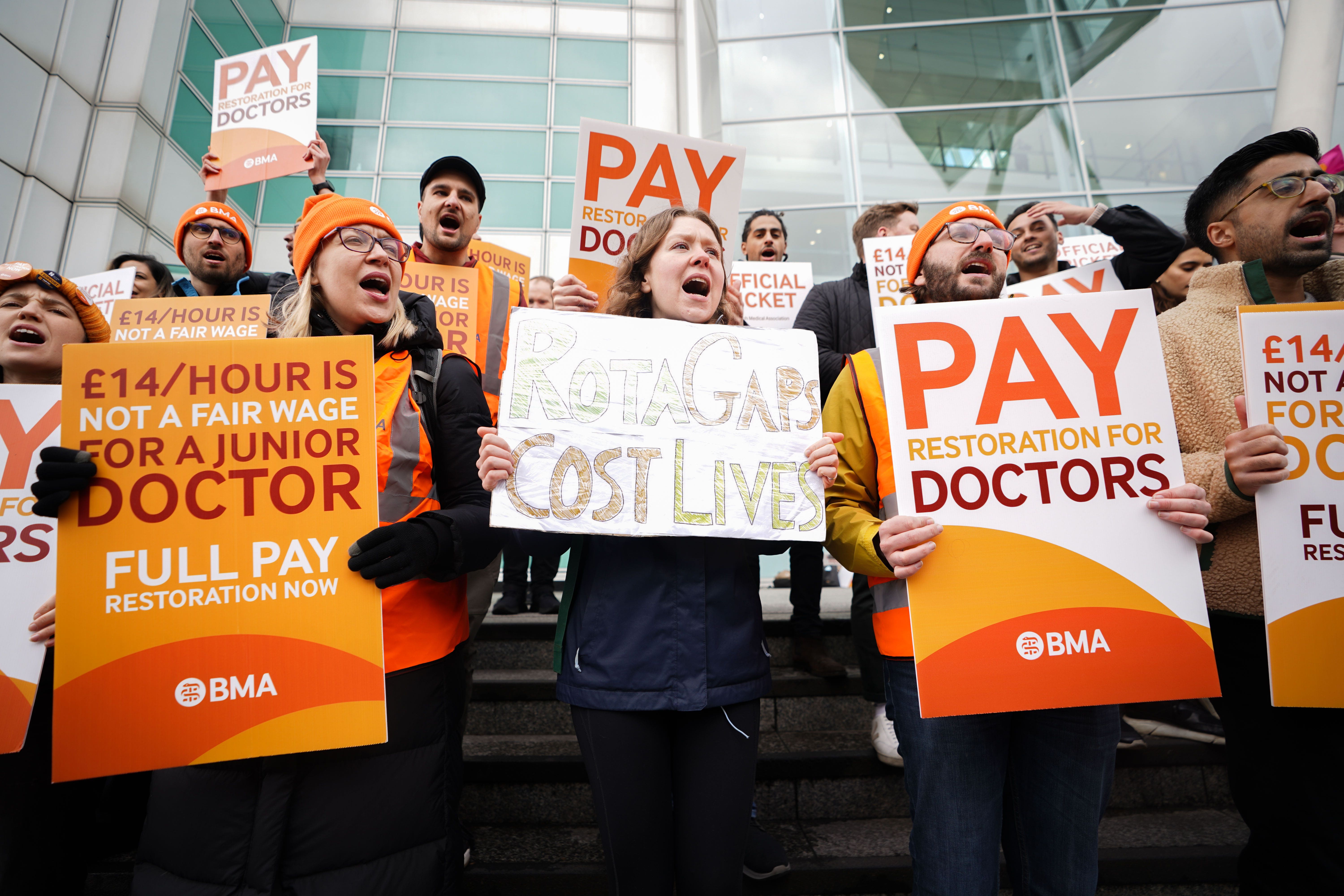Junior doctors ‘using food banks and borrowing rent money’
Around 50,000 junior doctors in England are taking part in industrial action in a bitter dispute over pay.

Your support helps us to tell the story
This election is still a dead heat, according to most polls. In a fight with such wafer-thin margins, we need reporters on the ground talking to the people Trump and Harris are courting. Your support allows us to keep sending journalists to the story.
The Independent is trusted by 27 million Americans from across the entire political spectrum every month. Unlike many other quality news outlets, we choose not to lock you out of our reporting and analysis with paywalls. But quality journalism must still be paid for.
Help us keep bring these critical stories to light. Your support makes all the difference.
Junior doctors on strike in a bitter dispute over pay have said they are struggling to afford groceries and borrowing money to pay rent.
Around 50,000 junior doctors in England are taking part in industrial action.
Medics on the picket lines have spoken about “living on the breadline” amid difficult working conditions.
Trainee anaesthetist Ada Zembrzycka said her colleagues are using food banks as they struggle with the cost of living.
The 27-year-old, who works at Whipps Cross Hospital in east London, said: “If the pay cuts continue I will not only struggle to pay (for) my exams but for groceries and my Tube tickets.
“Rent is increasingly going up and I can’t keep up.”
Speaking on a picket line outside St Thomas’ Hospital in central London, she told the PA news agency: “I do have colleagues who have to borrow money from their families to pay rent this year.”
Dr Hugh Adler, 35, a senior registrar in infectious diseases who was on the picket line outside the Royal Liverpool University Hospital, said: “The headline reason we’re here today is pay erosion.
“People feel devalued, they’re struggling to make ends meet. People are choosing to leave the NHS and we’re seeing the gaps in the rota.
“We want to stop this exodus and haemorrhaging of staff, particularly junior staff who are paid £14 an hour after coming out of a six-year degree.
“They could go to Australia and work fewer hours for more money.”
Dr George Dovey said he is working harder than ever to make sure patients are not left in the corridors at St Thomas’.
The 28-year-old said: “Our working conditions have got harder. I keep getting less resources.
“I often spend at least 10 minutes a day trying to find a computer that works. I have to do my work while sitting on a bin or desk.
“I am very much just above the breadline. I spent last night looking at jobs in Australia.”
Katrina Forsyth joined a British Medical Association (BMA) picket line after finishing her night shift at St Thomas’.
The junior doctor, who works in general surgery, said she has to rely on family and her partner to be able to afford to keep working in London.
We were clapped during Covid. I qualified early to try and help. When it comes to the point when we are really struggling to pay rent, people don’t care
The 29-year-old said: “We were clapped during Covid. I qualified early to try and help.
“When it comes to the point when we are really struggling to pay rent, people don’t care.”
Dr Mivanyi Kadala, who has been a junior doctor for nine years, was among those on the picket line outside the Royal Liverpool University Hospital.
The registrar in infectious diseases said: “One of the key things for me about all of this is how much the NHS is losing staff.
“If you haven’t got good staff retention you’re going to continuously struggle to offer a good service and something that will be safe for patients.”
Speaking on the same picket line, Dr Annie Bown, chairwoman of the BMA’s Mersey regional junior doctors committee, said: “I’m a junior doctor in my first year of working and I earn £14 an hour.
“As a junior doctor in my first year of working, when a patient becomes unwell on the wards the nurses will call me, and if that patient’s having difficulty breathing, or if their heart were to stop even, I would attend the ward, try to start their heart again and do all of that for £14 an hour.
“We’re asking for full pay restoration back to the levels it was at previously in 2008/2009. The reason we’re asking for this is because we’re not doing 26.1% less work, we’re not seeing 26.1% less patients – if anything the patients are more complex than ever.”
A new campaign from the BMA says junior doctors starting work in hospitals earn £14.09 per hour in their basic pay packet – which does not include additional payments for weekend or overnight pay.
The union claims junior doctors in England have seen a 26% real-terms pay cut since 2008/09 because pay rises have been below inflation.
It is asking for a full pay restoration that the Government has said would amount to a 35% pay rise – which ministers have said is unaffordable.